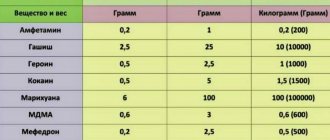1. Inducement to consume narcotic drugs, psychotropic substances or their analogues - is punishable by restriction of freedom for a term of up to three years, or arrest for a term of up to six months, or imprisonment for a term of three to five years.
2. The same act committed: a) by a group of persons by prior conspiracy or by an organized group; b) the clause became invalid on December 11, 2003 - Federal Law of December 8, 2003 N 162-FZ; c) in relation to two or more persons; d) with the use of violence or with the threat of its use - is punishable by imprisonment for a term of five to ten years, with or without restriction of freedom for a term of up to two years.
3. Acts provided for in parts one or two of this article, if they: a) are committed in relation to a minor; b) caused by negligence the death of the victim or other grave consequences - shall be punishable by imprisonment for a term of ten to fifteen years with deprivation of the right to hold certain positions or engage in certain activities for a term of up to twenty years or without it and with restriction of freedom for a term of up to two years. or without it.
Note. This article does not apply to cases of promoting the use of relevant instruments and equipment used for the consumption of narcotic drugs and psychotropic substances for the purpose of preventing HIV infection and other dangerous infectious diseases, if these acts were carried out in agreement with executive authorities in the field of health care and health authorities. control over the circulation of narcotic drugs and psychotropic substances.
(The note was additionally included from December 11, 2003 by Federal Law of December 8, 2003 N 162-FZ; as amended by Federal Law of November 25, 2013 N 317-FZ. - See previous edition)
Part 3 art. 230 of the Criminal Code of the Russian Federation
Acts provided for in parts one or two of this article, if they:
a) committed against a minor;
b) caused by negligence the death of the victim or other grave consequences, - shall be punishable by imprisonment for a term of ten to fifteen years with deprivation of the right to hold certain positions or engage in certain activities for a term of up to twenty years or without it and with restriction of freedom for a term of up to two years. or without it.
Note.
This article does not apply to cases of promoting the use of relevant instruments and equipment used for the consumption of narcotic drugs and psychotropic substances for the prevention of HIV infection and other dangerous infectious diseases, if these acts were carried out in agreement with executive authorities in the field of health care and internal affairs bodies business
Article 229.1 of the Criminal Code of the Russian Federation Smuggling of narcotic drugs, psychotropic substances, their precursors or analogues, plants containing narcotic drugs, psychotropic substances or their precursors, or their parts containing narcotic drugs, psychotropic substances or their precursors, instruments or equipment under special control and used for the manufacture of narcotic drugs or psychotropic substances
Article 230.1 of the Criminal Code of the Russian Federation Inducing an athlete to use substances and (or) methods prohibited for use in sports
Table of contents
Punishment for drug promotion
Responsibility for the promotion of psychotropic and narcotic drugs is provided for in Art. 6.13 Code of Administrative Offences. In accordance with Russian legislation, propaganda is considered to be the actions of legal entities and individuals aimed at disseminating information about methods of acquiring, manufacturing and storing psychotropic and narcotic substances. Propaganda can be carried out through the production and distribution of books and other printed materials, as well as using the media and computer networks.
Drug propaganda falls under Article 46 of the Federal Law. The note to the law states that information about tools and equipment for using drugs is not propaganda of drugs if it is distributed for the purpose of preventing HIV and other diseases, with the sanction of the relevant authorities.
1
0
0
1
0
0
Commentary to Art. 230 of the Criminal Code of the Russian Federation
Commentary edited by Esakova G.A.
1. The subject of the crime is narcotic substances, psychotropic drugs and their analogues (see commentary to Article 228 of the Criminal Code).
2. The objective side is expressed in the tendency to consume narcotic drugs, psychotropic substances and their analogues. Inducement is any intentional action, including a one-time action, aimed at arousing in another person a desire to consume items specified in the law (persuasion, proposals, giving advice, etc.), deception, mental or physical violence, restriction of freedom, etc. actions performed with the aim of forcing consumption by the person under influence (see Resolution of the Plenum of the Supreme Court of the Russian Federation of June 15, 2006 No. 14).
3. The crime is considered completed, even if the accused person did not actually use the narcotic drug, psychotropic substance, or their analogue.
4. Other grave consequences in paragraph “b” of Part 3 of the commented article should be understood as suicide or attempted suicide of the victim, the development of drug addiction, a serious illness associated with the use of narcotic drugs or psychotropic substances, HIV infection, etc. .P. (Clause 28 of the Resolution of the Plenum of the Supreme Court of the Russian Federation of June 15, 2006 No. 14).
The concept of addiction to drug use
Inducing the consumption of psychotropic and narcotic substances is an illegal action, the purpose of which is to incite other persons to a one-time or systematic use of prohibited substances.
Such actions can manifest themselves in two forms:
- arousing another person's interest in drugs and the desire to try them (achieved through suggestions, persuasion, giving advice, deception, requests, etc.);
- Forcing the victim to take drugs through threats or violence.
Violence used to force drug use can be physical or mental. Physical violence against the victim is manifested in harm to his health (of varying degrees of severity), torture, beatings, restriction of freedom and other violent actions. Mental violence is expressed in intimidation and threats of violence and causing harm.
The consumption of narcotic and psychotropic substances can be carried out in different ways:
- oral administration in the form of tablets (barbamyl, codeine), powders (opium, morphine) or infusions (poppy straw);
- injections (promedol, morphine);
- snorting (cocaine);
- smoking (anasha, plan, hashish);
- chewing (coca leaves), etc.
Inducement to use drugs is a concept that covers any type of incitement to take drugs. When inducing people who have not previously used such drugs, they often use praise for the sensations they receive and deception that, in fact, they can stop taking them at any time at will.
Commentary on Article 230 of the Criminal Code of the Russian Federation
Commentary edited by Rarog A.I.
1. Inducement, as a special type of incitement, involves such an influence on another person, as a result of which he attempted or actually consumed a narcotic drug or psychotropic substance.
2. If a person who encouraged the consumption of narcotic drugs or psychotropic substances sold these drugs or substances or assisted in their theft or extortion, acquisition, storage, production, processing, transportation or shipment, his actions must be additionally qualified under Art. Art. 228, 228.1 or 229 CC.
3. The subjective side is characterized by direct intent.
4. On the content of the qualifying feature by a group of persons by prior conspiracy or by an organized group (clause “a”, part 2), see the commentary to part 2 and 3 of Art. 35 of the Criminal Code.
5. On the content of the sign of committing a crime in relation to two or more persons, see the commentary to paragraph “a” of Part 2 of Art. 105 of the Criminal Code.
6. Violence (clause “g”, part 2) involves beatings or committing other violent acts that cause physical pain, causing mild, moderate, or serious harm to health (without aggravating circumstances). Causing serious harm to health under the circumstances provided for in Part 2 or 3 of Art. 111 of the Criminal Code, should be qualified according to the totality of clause “d”, part 2 of Art. 230 and the corresponding part of Art. 111 of the Criminal Code.
7. A particularly qualified type of crime in question (Part 3 of Article 230) is characterized by the commission of a crime against a minor and the negligent infliction of death or other grave consequences. Qualification of the crime in question as committed against a minor (clause “a”, part 3) is possible in the presence of two circumstances: a) the perpetrator knew about the minority of the victim and wanted to induce him to consume narcotic drugs and psychotropic substances; b) the perpetrator has reached the age of 18. To impute the element provided for in paragraph “b” of part 3 of the commented article, it is necessary to establish that the death was the careless result of violence used to force the consumption of narcotic drugs or psychotropic substances, or was a consequence of their consumption. This consequence is covered by Part 3 of this article and does not require additional qualifications under Art. 109 of the Criminal Code.
Other serious consequences should be understood as suicide or attempted suicide of the victim, the development of drug addiction, a serious illness associated with the use of narcotic drugs or psychotropic substances, HIV infection, etc.
According to the note, the effect of Art. 230 of the Criminal Code does not apply to cases of promoting the use of relevant instruments and equipment used for the consumption of narcotic drugs and psychotropic substances for the prevention of HIV infection and other dangerous infectious diseases, if these acts were carried out in agreement with executive authorities in the field of health care and control authorities for the trafficking of narcotic drugs and psychotropic substances.
Commentary on Article 230 of the Criminal Code of the Russian Federation
Commentary edited by A.V. Brilliantova
According to the note to Art. 230 of the Criminal Code of the Russian Federation, its effect does not apply to cases of propaganda of the use of relevant instruments and equipment used for the consumption of narcotic drugs and psychotropic substances for the purpose of preventing HIV infection and other dangerous infectious diseases, if these acts were carried out in agreement with executive authorities in the field of healthcare and authorities for control over the circulation of narcotic drugs and psychotropic substances.
The object of the crime is public health.
The subject of the crime is narcotic drugs and psychotropic substances, as well as plants containing narcotic drugs or psychotropic substances, or their parts containing narcotic drugs or psychotropic substances.
The objective side of the crime is characterized by action in the form of inducement to consume narcotic drugs or psychotropic substances.
Inducement to consume narcotic drugs or psychotropic substances (Article 230 of the Criminal Code of the Russian Federation) can be expressed in any intentional actions, including one-time actions, aimed at arousing another person’s desire to consume them (in persuasion, proposals, giving advice, etc. ), as well as deception, mental or physical violence, restriction of freedom and other actions committed with the aim of forcing the consumption of narcotic drugs or psychotropic substances by the person under influence. If a person who incited the consumption of narcotic drugs or psychotropic substances sold these drugs or substances or provided assistance in their theft or extortion, acquisition, storage, production, processing, transportation or shipment, his actions must be additionally qualified if there are grounds for this. according to the relevant parts of Art. Art. 228, 228.1 or 229 of the Criminal Code of the Russian Federation
The consumption of narcotic drugs or psychotropic substances involves introducing them into the human body by any means. This can be through ingestion of tablets, injections, smoking, inhalation, chewing and other methods.
The corpus delicti is formal.
Paragraph 27 of the Resolution of the Plenum of the Supreme Court of the Russian Federation dated June 15, 2006 N 14 “On judicial practice in cases of crimes related to narcotic drugs, psychotropic, potent and toxic substances” indicates that in order to recognize inducement as a completed crime, it is not required that the inclining person actually used a narcotic drug or psychotropic substance. At the same time, we believe that when deciding the moment of the end of the inducement to use drugs, it is also necessary to take into account the Resolution of the Plenum of the Supreme Court of the Russian Federation of February 1, 2011 No. 1 “On the judicial practice of applying legislation regulating the specifics of criminal liability and punishment of minors” , which determines the moment of termination of the involvement of a minor in the commission of a crime and antisocial actions. Since the terms “involvement” in Art. Art. 150, 151 of the Criminal Code of the Russian Federation and “declension” in Art. 230 of the Criminal Code of the Russian Federation coincide in content, they should be interpreted identically.
Paragraph 42 of the Resolution of the Plenum of the Supreme Court of the Russian Federation dated February 1, 2011 No. 1 established that crimes for which liability is provided for in Art. Art. 150 and 151 of the Criminal Code of the Russian Federation are completed from the moment a minor commits a crime, preparation for a crime, attempted crime, or after committing at least one of the antisocial actions provided for by the disposition of Part 1 of Art. 151 of the Criminal Code of the Russian Federation (systematic consumption of alcoholic beverages, intoxicating substances, vagrancy or begging). If the consequences provided for by the dispositions of the above norms did not occur due to circumstances beyond the control of the perpetrators, then their actions can be qualified under Part 3 of Art. 30 of the Criminal Code of the Russian Federation and under Art. 150 or art. 151 of the Criminal Code of the Russian Federation
The subjective side of the crime is characterized by guilt in the form of direct intent.
The general subject of the crime is a person who has reached the age of 16 years.
The qualified corpus delicti (Part 2 of Article 230 of the Criminal Code of the Russian Federation) constitutes an act committed:
– a group of persons by prior conspiracy or an organized group (clause “a”);
– in relation to two or more persons (clause “c”).
Clause “c” of Part 2 of Art. 230 covers both the simultaneous inducement of several persons to use drugs, and several episodes of involving two or more victims in the use of drugs in the absence of a single intent on the part of the perpetrator;
– with the use of violence or the threat of its use (the offense includes beatings, causing minor and moderate harm to health) (clause “d”). The serious harm caused to health should be qualified in conjunction with Art. 111 of the Criminal Code of the Russian Federation
A particularly qualified crime (Part 3 of Article 230 of the Criminal Code of the Russian Federation) provides for liability for inducing a minor (clause “a”), as well as for inducement if it negligently resulted in the death of a person or other grave consequences (clause “b”) .
Clause “a”, Part 3, Art. 230 of the Criminal Code of the Russian Federation is charged if the perpetrator knew about the minor age of the victim or admitted that the victim had not reached the age of 18 years.
Inducement to consume narcotic drugs or psychotropic substances, resulting in the death of the victim through negligence, is covered by the disposition of Part 3 of Art. 230 of the Criminal Code of the Russian Federation and does not require additional qualifications under the criminal law, which provides for liability for causing death by negligence.
Other serious consequences should be understood as suicide or attempted suicide of the victim, the development of drug addiction, a serious illness associated with the use of narcotic drugs or psychotropic substances, HIV infection, etc.
According to the note to Art. 230 of the Criminal Code of the Russian Federation, its effect does not apply to cases of propaganda of the use of relevant instruments and equipment used for the consumption of narcotic drugs and psychotropic substances for the purpose of preventing HIV infection and other dangerous infectious diseases, if these acts were carried out in agreement with executive authorities in the field of health care and authorities for control over the circulation of narcotic drugs and psychotropic substances.








